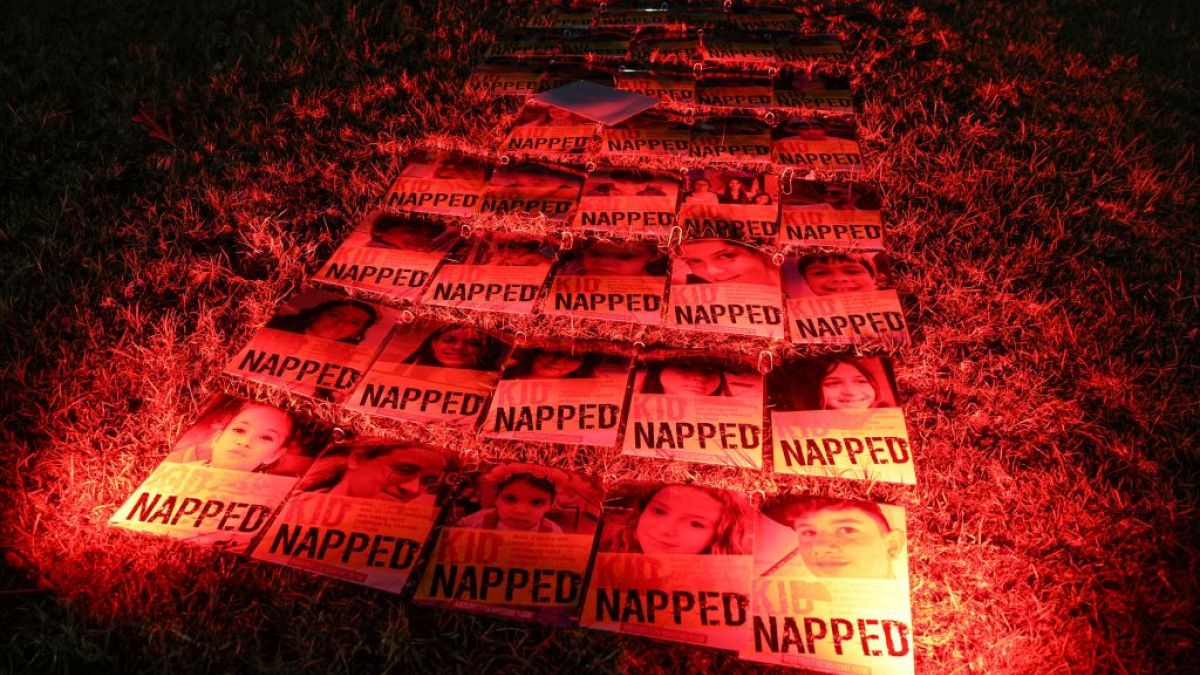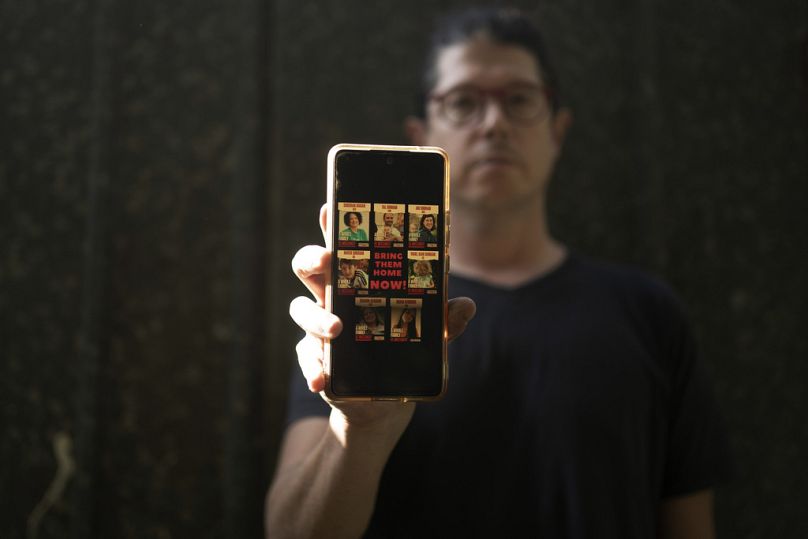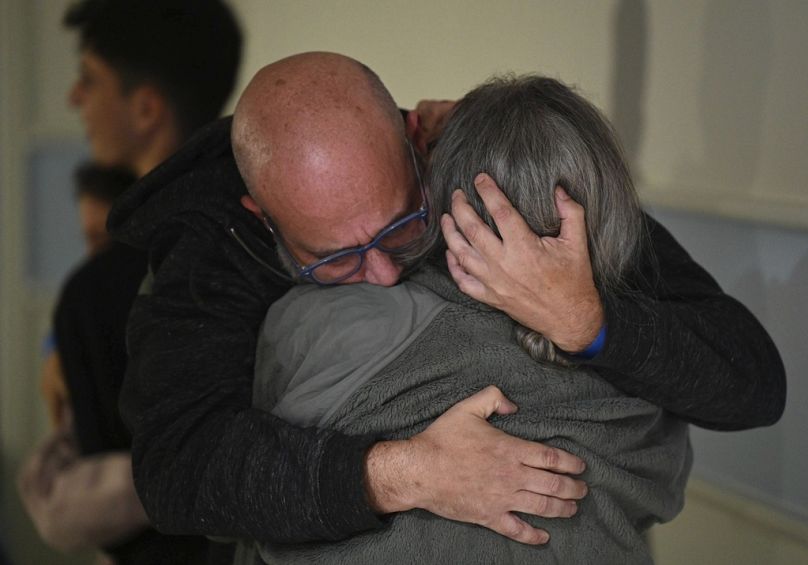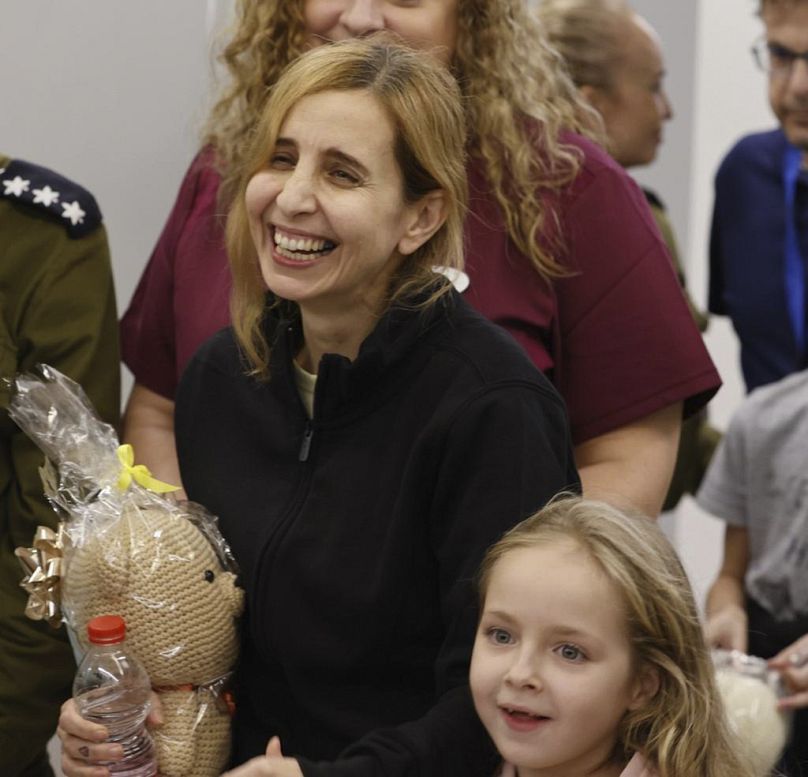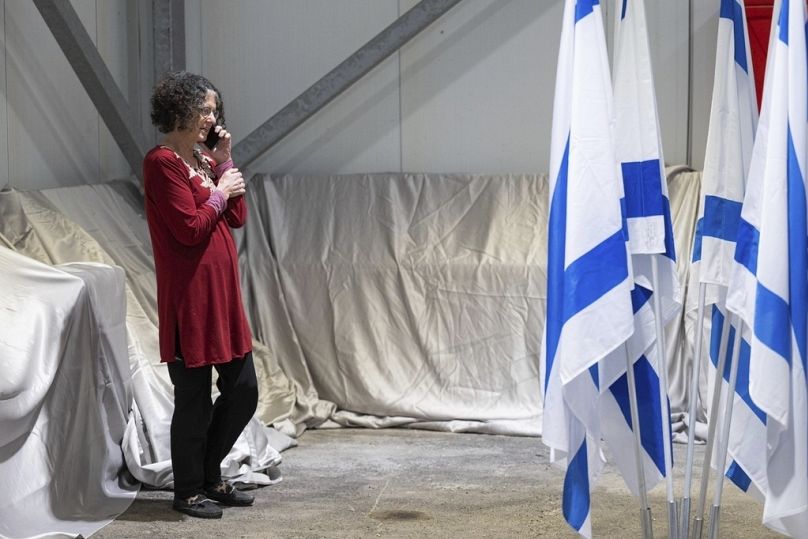Doctors warn the weeks these children spent in captivity will take its toll even more as the conflict continues.
After seven weeks held hostage in the tunnels of Gaza, they are finally free to laugh and chat and play. Some of the children who have come back from captivity, though, are still reluctant to raise their voices above a whisper.
In theory, they can eat what they want, sleep as much as they choose and set aside their fears. In practice, however, some have had to be convinced there’s no longer a need to save a cherished bit of food in case there is none on offer later.
86 Israelis released during a short-lived truce between their government and Hamas are home.
The attack on 7 October wreaked by Palestinian militants on roughly 20 towns and villages, though, has left many of the children among them without permanent homes to go back to. Some of their parents are dead and others are still held hostage - foreshadowing the difficulty of days ahead.
Step by step, these children, the mothers and grandmothers who were held alongside them, as well as their extended families are testing the ground for a path to recovery. No one, including the physicians and psychologists who have been treating them, is sure how to get there or how long it might take.
It was clear as soon as the youngest were helped from helicopters that captivity had been brutal.
“They looked like shadows of children,” said Dr. Efrat Bron-Harlev of Schneider Children’s Medical Centre in suburban Tel Aviv, who helped treat more than two dozen former captives, most of them youngsters.
Some had not been allowed to bathe during the entirety of their captivity. Many had lost up to 15% of their total weight, but were reluctant to eat the food they were served.
Asked why, the answer came in whispers: “’Because we have to keep it for later.’”
One 13-year-old girl recounted how she’d spent the entirety of captivity believing that her family had abandoned her, a message reinforced by her kidnappers, Bron-Harlev said.
“They told me that nobody cares for you anymore. Nobody’s looking for you. Nobody wants you back. You can hear the bombs all around. All they want to do is kill you and us together,” the girl told her doctors.
After enduring such an experience, “I don’t think it’s something that will leave you,” Dr. Yael Mozer-Glassberg, who treated 19 of the children released explains. “It’s part of your life story from now on.”
In the days since the hostages were freed, nearly all have been released from hospitals and rejoined their families, including some welcomed back by thousands of well-wishers.
Doctors and others charged with treating the former hostages spent weeks preparing for their return. But the realities of caring for so many who endured such extremes has stunned physicians, starting with the reluctance of many children to speak.
“Most of them talk about needing to be very quiet. At all times. Not to stand up. Not to talk. Of course, not to cry. Not to laugh. Just to be very, very quiet,” said Bron-Harlev.
“What these children have gone through is simply unimaginable.”
Despite that, at times now some appear to be thriving.
Noam Avigdori, 12, who was released with her mother, has spent the past week trading jokes with her father, meeting with friends and has even ventured out to a store.
“When I say, ‘Noam, do this, go do that,’ she says, ‘Dad, you know what happened to me.’ And she knows that she can squeeze that lemon and.… she’s enjoying it,” her father, Hen Avigdori, said in an interview.
But there are also nights when his daughter wakes up screaming, he added.
Nearly all those who have been freed have said little publicly about the conditions of their captivity. Their families say officials have told them not to disclose details of their individual treatment, for fear of putting those still being held in further jeopardy.
Interviews with their families, doctors and mental health professionals, as well as statements released by officials and others make clear that while all the hostages suffered, show their experiences in captivity varied significantly.
Some were isolated from their fellow hostages. Others, like Noam Avigdori and her mother, Sharon, were held together with relatives, making it possible for the 12-year-old to act as something like an older sibling to the young cousins who were held with her.
“Everyone who was with a family member or with friends was in much better condition” when they were released, said Dani Lotan, a clinical psychologist at Scheider who treated some of the former hostages.
That varies, though, even within families.
In the weeks they were imprisoned, Danielle Aloni and her 5-year-old daughter, Emilia, established a close friendship with one of the imprisoned Thai farm workers, Nutthawaree Munkan. Last week, after all were released, the girl sang to a delighted Munkan when they were reunited in a video call, reciting the numbers she learned in Thai during captivity.
But Emilia’s cousins, 3-year-old twins, are having a difficult time since their return.
In captivity, Sharon Aloni was held with her husband and one of their twin girls in a small room, together with eight or so others. The couple spent “10 agonising days” believing their other daughter had been killed, when she was snatched away shortly after they were taken into Gaza.
That lasted until the day Sharon insisted to her husband that she could hear the cries of their missing daughter, Emma. Minutes later, a woman appeared without explanation to bring them the child, a joyous reunion that allowed mother and daughters to stay together throughout the remainder of their captivity - but a couple of days before they were released, the girls' father was taken away and his whereabouts remain unknown.
Now free, the girls wake up crying in the middle of the night, Moran Aloni said. Emma won’t allow anyone to leave her side. They have got used to speaking with volume again, but their mother still whispers.
Many former hostages have recounted being given meagre amounts of food, although rations seemed to vary from group to group with little explanation.
One family told doctors they were each given a biscuit with tea at 10 every morning and, from time to time, a single dried date. At 5pm they were served rice. It wasn’t enough, but day after day of worry left their appetites to wither.
One 15-year-old girl recounted not eating for days so she could give her share of the food to her 8-year-old sister.
Some of the 23 Thai hostages released recently told caregivers they were each given roughly a half litre of water and then had to make it last for three days. Sometimes, they said, it was saltwater.
One group of former captives reported being allowed to bathe just three times over seven weeks with buckets of cold water - but, according to doctors, one child never bathed at all.
The process of recuperation from such prolonged trauma will be slow and piecemeal, doctors say. While the adults may be better able to process what they have experienced compared to the child victims, their recovery poses its own challenges.
Many, particularly the older and infirm, remain weak after losing significant amounts of weight due to the meagre rations provided by their captors. When they speak, their families hear notes of resilience, but also of fragility.
Yaffa Adar, 85, a Holocaust survivor who was seized from her kibbutz and hustled into Gaza on a golf cart, talks at length with her family about her time in captivity. The days since have become more difficult as she grapples with what happened to her and the community she cherished, granddaughter Adva Adar said.
“She’s incredibly mentally strong, but you can see how the hell got into her soul,” the younger Adar said. “It’s in the way she looks at the world, the way she looks at people.”
In the hospitals, doctors, social workers and psychologists were careful about how they talked with the former hostages, not wanting to magnify their trauma.
As they settle in back at home, however, both children and adults are confronting the toll of the October attack that captivity kept hidden from them.
Throughout the seven weeks she was held, Shoshan Haran, her daughters and grandchildren had to wonder what had happened to her husband.
“We had to tell them my father was murdered,” Yuval Haran said.
In the days ahead, experts say the hostages and their families will face questions about how to move forward without those who were killed or remain missing - but for most, it is far too soon.
